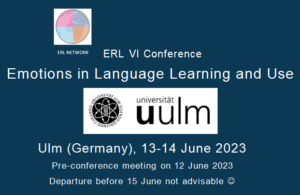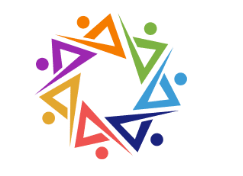We start a completely new ERL stage: following conferences covering 4 educational domains (beliefs, actions, affect, and thinking), we open a cycle of (complementary) events during which we’ll be focusing on one of the domains each time we meet.
We begin by prioritising the affective component of our linguistic functioning
and so encourage you to join our conference:

In order for the event to be possibly comprehensive, its scope will range from concepts to sciences. Such broadening of perspective we intend to achieve by orienting the event around four (increasingly wider) modules reflecting 4 major aims:
| Major objective | Module | Exemplary problems |
| to discuss different perspectives on the link between language and emotions (language OF emotions, language VS. emotions, language FOR emotions, language-oriented emotions, etc.) | CONNECTIONS
|
What is first – language or emotions?
To be or nor to be emotional about language itself? |
| to address the language-and-emotions link on the level of (complex) personal identities/structures, educational systems, societies and cultures | SYSTEMS
|
What (personal, cultural, societal) factors determine our emotional approach to language learning and use?
To what extent is the emotional side of language learning and use taken into account by different educational systems across the globe? |
| to consider how the affective component of language determines what we think OF language (language beliefs), what we do WITH language (language actions), and how we understand the world THROUGH language (language matrices) | DOMAINS
|
How do emotions relate to our language skills?
When do emotions support or hinder language learning? |
| to share how various disciplines contribute to our understanding of the language-and-emotions link and to embark on interdisciplinary studies not undertaken earlier in the field |
DISCIPLINES
|
Whare does modern psycholinguistics take language learning and teaching?
Which theories and methodologies to apply for the studies on the language-and-emotions link? |
KEYNOTE TALKS:
Bilingualism as a lens to the mind and the brain
Judith Kroll
Achievement Emotions: State of the Art, Challenges, and Future Directions
Reinhard Pekrun
Emotional content and psychological context in language perception and memory: Lessons from neuroscience studies
Johanna Kissler
Grounding of concrete and abstract concepts in brain systems related to perception, action and introspection
Markus Kiefer
Holistic approaches to the study of emotions and identity in language learning and use
Adrienn Fekete
MORE INFORMATION COMING SOON
If you have any questions, wishes, commens, suggestions, etc., do feel free to write at educationalroleoflanguage@gmail.com


